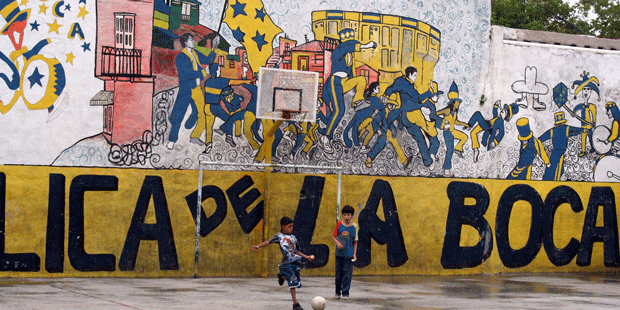There is an extraordinary moment in a television interview with Carlos Tevez from a couple of years ago. It was 2015 and the Argentine striker had recently returned to Boca Juniors, the most celebrated club in arguably the world’s most soccer-crazed nation. The precocious Tevez had risen from abject poverty to land a spot at Boca at just 16 years old. From there, he went on to have an illustrious and lucrative career that took him through Brazil, England and Italy before his return to the Buenos Aires port and the iconic Bombonera Stadium, where Boca Juniors plays home games. He led Boca to a local championship in 2016 and cemented his status as the people’s idol, second only to the deified Diego Maradona.
In the 2015 interview, the commentator, Alejandro Fantino, is peppering Tevez with questions about his neighborhood, a notoriously poor, violent housing project known locally as Fuerte Apache. Through a circumspect line of questioning, Fantino tries to get a sense of what it is like for Tevez to return laden with a decade’s worth of international soccer wealth to a country racked by poverty. Tevez gets the idea. He understands he is supposed to talk about the guilt provoked by his riches, the alienation from his friends and old neighborhood. But it is simply not his case.
“Look, Ale, I’ve been getting together with my friends once or twice a week. And you know what? We meet in the ‘hood… I get together with five or six friends — I think maybe three of them have work — and every time I go, they pay for everything,” Tevez says, choking back tears. When the camera goes back to Fantino, the commentator too quickly swipes away a tear with his thumb.
“That’s how I know where I’m from,” Tevez adds.
Where is Carlos Tevez from, exactly? Here is a little context: The IMF puts Argentina’s per capita GDP at nearly $15,000 annually, and traditionally the country has had one of Latin America’s strongest middle classes, but the wealth disparity is abysmal and growing. In neighborhoods like Fuerte Apache, just a 30-minute city bus ride from Buenos Aires’ cosmopolitan core, entire families survive on less than $200 a month. In hard scrabble projects like Fuerte Apache, the razor-thin margins are palpable and the effects of poverty concrete.
While Tevez chooses to be reminded of his origins by his friends’ solidarity, his past holds a laundry list of dark events that also serve as reminders. He was abandoned by an alcoholic mother at six months old. Just four months later, he pulled a kettle of boiling water off a stove and burned himself badly. The braids of marbled scar tissue on the right side of his face, neck and chest are still visible. At five years old, Tevez’s dad died after being shot 23 times and young Carlos was adopted by his aunt and uncle, who also lived in Fuerte Apache.
It was soccer that saved him. As the story goes, a coach and scout for the local club All Boys saw a six-year-old Tevez kicking a rock and sought out the youngster for the club’s youth system. But his uncle and legal guardian, Segundo Tevez, avoided the scout’s offers to send Tevez to the local club because he could not afford cleats. The scout eventually figured out the situation and bought Tevez shoes, igniting the young striker’s dizzying rise through the ranks of local, then international soccer.
But even as Tevez succeeded, Fuerte Apache took its toll. He tells of returning home when he first signed with Boca to find that his family was going hungry. Years later, when he was playing in England, police arrested and jailed his brother for robbing an armored truck. His best friend from childhood committed suicide while running from the police.
Despite all of it, or maybe because of it, Tevez persisted on the pitch and turned himself into one of the most dynamic, tenacious and creative goal-scorers in international soccer. Nicknamed ‘El Apache’ in Argentina, the diminutive Tevez — he’s just 5’6” — often flashed a Fuerte Apache t-shirt under his toothy smile while celebrating goals. Tevez, now 33, has three children with his childhood girlfriend, whom he met at 13 in Fuerte Apache. They finally married in December of last year, soon after Tevez became one of the world’s best paid athletes when he signed a two-year contract with China’s Shanghai Shenhua reportedly worth more than $87 million over two years. Although reports on contract details vary a bit, observers point out that Tevez is making more than a dollar a second. One wonders what a kid from Fuerte Apache would even do with that kind of money, and if his friends will let him pick up the tab when he returns.
Brian Hagenbuch
14 Mar 2017




































